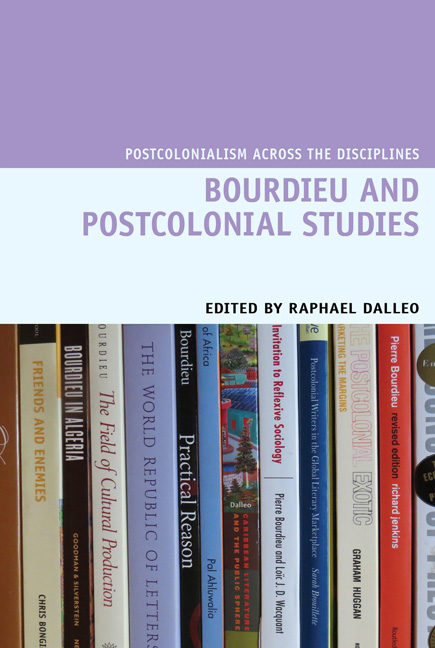Book contents
- Frontmatter
- Contents
- Permissions
- Introduction
- 1 Writing at the Margins: Postcolonialism, Exoticism and the Politics of Cultural Value (from The Postcolonial Exotic)
- 2 Exiles on Main Stream: Valuing the Popularity of Postcolonial Literature (from Friends and Enemies)
- 3 Postcolonial Authorship Revisited (from Postcolonial Writers in the Global Literary Marketplace)
- 4 Bourdieu and Fanon on Algeria
- 5 Style as Habitus: World Literature, Decolonization and Caribbean Voices
- 6 Playing the Game? The Publication of Oswald Mtshali
- 7 Fields in Formation: English Studies and National Literature in South Africa (with a Brazilian Comparison)
- 8 Archived Relationships: Pierre Bourdieu and Writers of the Caribbean Diaspora
- 9 Irony in the Dungeon: Anamnesis and Emancipation
- About the Contributors
- Index
1 - Writing at the Margins: Postcolonialism, Exoticism and the Politics of Cultural Value (from The Postcolonial Exotic)
- Frontmatter
- Contents
- Permissions
- Introduction
- 1 Writing at the Margins: Postcolonialism, Exoticism and the Politics of Cultural Value (from The Postcolonial Exotic)
- 2 Exiles on Main Stream: Valuing the Popularity of Postcolonial Literature (from Friends and Enemies)
- 3 Postcolonial Authorship Revisited (from Postcolonial Writers in the Global Literary Marketplace)
- 4 Bourdieu and Fanon on Algeria
- 5 Style as Habitus: World Literature, Decolonization and Caribbean Voices
- 6 Playing the Game? The Publication of Oswald Mtshali
- 7 Fields in Formation: English Studies and National Literature in South Africa (with a Brazilian Comparison)
- 8 Archived Relationships: Pierre Bourdieu and Writers of the Caribbean Diaspora
- 9 Irony in the Dungeon: Anamnesis and Emancipation
- About the Contributors
- Index
Summary
Postcolonialism in the Age of Global Commodity Culture
The Trouble with Postcolonialism
Critiques of postcolonialism have intensified over the last decade, by no coincidence the decade that has also brought postcolonial studies to prominence as an institutionalized academic field. Postcolonial studies, though never fully accepted within the academy, has become distinctly fashionable; ‘postcolonial’ is a word on many people's lips, even if no one seems to know quite what it means. Like other commodified terms used largely for academic purposes, postcolonialism has taken full advantage of its own semantic vagueness. Like its sister term, postmodernism, it has yielded a cache of definitions, each of these recognized as provisional, as if in anticipation of the next to come. It would be simple, but also simplistic, to be cynical about this definition industry which, in an era of academic overproduction, has helped to keep people in careers; the fact remains that postcolonialism, for all its definitional—not to mention methodological—inconsistencies, has provided a catalyst for some of the most exciting intellectual work to be seen today. To ask ‘what is postcolonialism?’ appears, in any case, to be less productive than to ask some such other question as ‘what can postcolonialism do?’. Bart Moore-Gilbert, in his recent survey Postcolonial Theory(1997), puts the case for postcolonial criticism as ‘a more or less distinct set of reading practices ... preoccupied principally with analysis of cultural forms which mediate, challenge or reflect upon … relations of domination and subordination’ (12). These relations, continues Moore-Gilbert, ‘have their roots in the history of modern European colonialism and imperialism,’ but they also ‘continue to be apparent in the present era of neocolonialism’ (12). While this is as good a working definition as any, it still leaves room for doubt. For as Moore-Gilbert himself recognizes, it is far too broad and still too narrow: too broad in the obvious sense that too much time and space is covered, too narrow in that it excludes other, possibly related oppositional practices. The trouble with postcolonialism, when seen as a broad-based critical method, is that it risks being collapsed into a catch-all ‘metaphor for cultural embattlement’ (Suleri 1992b).
- Type
- Chapter
- Information
- Bourdieu and Postcolonial Studies , pp. 17 - 52Publisher: Liverpool University PressPrint publication year: 2016

